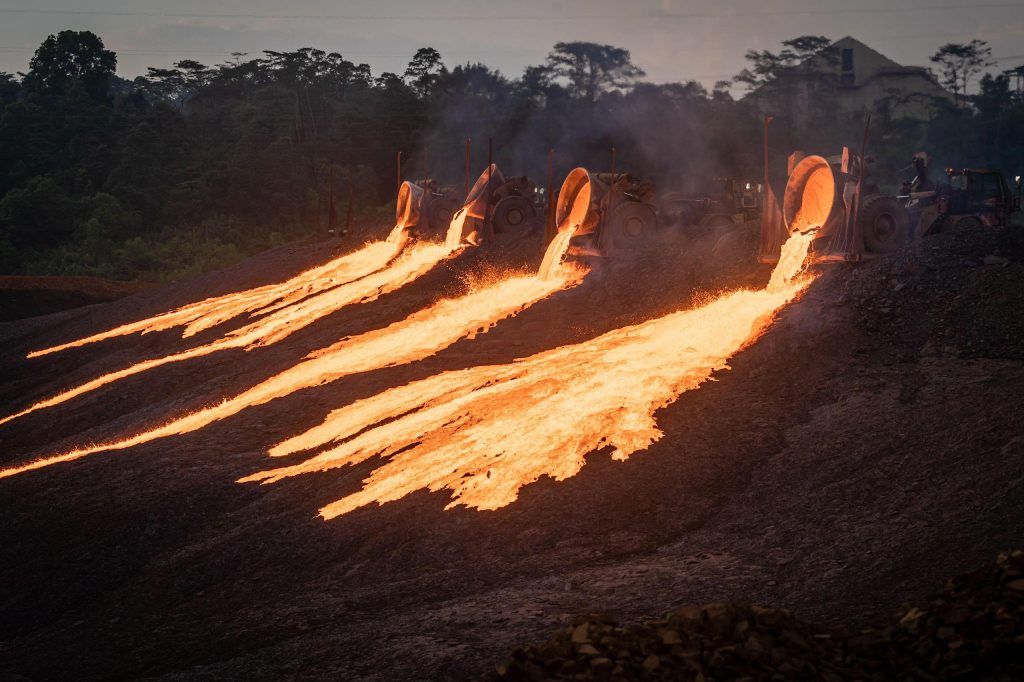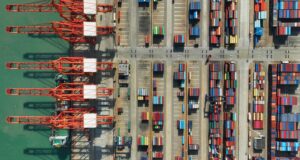
Indonesia’s next president, Prabowo Subianto, will take office in October. At the Qatar Economic Forum in May, he promised to achieve 8% GDP growth within two to three years, an ambitious target given that growth this year is around 5%. He said the nickel industry would be a major driver of increased growth.
In recent years, Indonesia has made regulatory changes to try to capture more value from its natural resources, particularly nickel and aluminium ores. Rather than continuing to sell the minerals to be processed abroad, there has been a push to refine them in domestic facilities for export or for use in manufacturing higher-value products such as batteries for electric vehicles. Most refining facilities in Indonesia are located in industrial parks, largely owned by Chinese companies. As these parks are typically powered by “captive” coal-fired power plants, which operate off-grid specifically for industrial use, they cause air pollution and emit a lot of CO2.
This plan to add value has also faced several other challenges.
First, Indonesia’s nickel products are mostly of low quality; known as Class 2, they contain less than 99.8% nickel. These lower-quality products are mainly used in stainless steel production rather than in batteries for electric vehicles. As a result, the country’s ambition to become a leading battery power in Southeast Asia may still be far from being achieved.
Second, 89% of Indonesia’s nickel products, mostly semi-processed, are exported to China. In other words, the domestic high-tech industry is not benefiting much from nickel.
Third, huge tax incentives for nickel smelters are not matched by adequate supply of nickel ore, forcing smelting companies to import ore from the Philippines.
Fourth, environmental and labor practices in Indonesia have come under criticism, especially in comparison to standards in regions such as the EU and the US. Concerns have been raised due to numerous incidents involving environmental pollution, workplace safety issues, and social conflicts with local communities and indigenous peoples.
The economic benefits of nickel are exaggerated
Of the 24 gigawatts (GW) of operating capacity of all captive coal-fired power plants in Indonesia, more than 75% (8.2 GW) is dedicated to metals and mining, according to Global Energy Monitor. Of this, nickel alone consumes about half (11.6 GW).
A recent study estimates that by 2025, emissions from nickel smelters and the captive coal-fired power plants that supply them will cost the provinces of Central Sulawesi, Southeast Sulawesi and North Maluku approximately USD 2.63 billion. This study, released in February by the Center for Economic and Legal Studies (CELIOS), where I serve as executive director, in collaboration with the Center for Research on Energy and Clean Air (CREA), highlights the significant economic impact of these emissions in the region.
Our research also indicates that if the nickel industry continues to expand without further regulation, there will be more than 3,800 excess deaths in 2025 and nearly 5,000 in 2030.
Little effort has been made to replace the country’s existing captive coal-fired power plants by investing in renewable energy, such as hydropower and new transmission networks by PLN (Indonesia’s state-owned electricity company). Investment to promote renewables also appears to be declining.
New investments for the transition from captive coal power plants are seen as costs that reduce the competitiveness of the nickel industry. This view is often supported by large government incentives for nickel smelting companies, such as tax breaks and benefits, without strict environmental requirements being imposed.
China can play a major role in improving the situation by raising its labour and environmental standards. It remains to be seen whether Prabowo will encourage this by revising regulations, such as Presidential Decree 112/2022, which still allows the construction of new captive coal plants. China’s President Xi Jinping has pledged not to build new coal-fired power plants abroad, although it is unclear whether captive plants are exempt.
Another challenge is the environmental damage caused by nickel smelters and mining, such as in Morowali regency in Central Sulawesi. Smelter waste warms coastal waters, pushing fish further out to sea, thereby increasing fuel costs for fishermen, as our study points out.
According to our findings, over the next 15 years, nickel mining in the three provinces studied will cause losses of up to USD 234.84 million for farmers and fishermen. The government has rarely acknowledged or acted to reduce such impacts.
The claim that nickel positively affects the economy, by increasing exports and GDP, also deserves further analysis.
When a nickel smelter is being built, economic activity and employment do increase. However, during its operation, our report predicted future economic disadvantages due to environmental and health impacts that have begun to affect GDP in producing regions such as Morowali, Konawe in South-East Sulawesi and North Maluku.
How can Prabowo address nickel and its environmental issues?
Indonesia’s relatively low standards and poor record on environmental safeguards will make it difficult to access global markets. For example, in Maluku, the lives of the Hongawa Manyawa indigenous people have been disrupted by nickel mining, with mining companies destroying large areas of the rainforest they call home.
Export destination countries, including the EU and the US, have been tightening their regulations. The EU’s Critical Minerals Act, its Corporate Sustainability Due Diligence directive, and the US Anti-Inflation Act make nickel products processed in Indonesia less attractive.
As a result, Indonesia will remain dependent on China. If China’s economy slows down, the nickel industry ecosystem in Indonesia will be affected. The drop in nickel prices after the pandemic should reflect the importance of meeting higher standards to access potential markets other than China.
In June, European companies BASF and Eramet cancelled a joint investment of USD 2.6 billion to build a nickel-cobalt refining complex in Weda Bay, North Maluku. This is a major blow to Indonesia’s ambitions in the downstream sector and its goal of attracting investors from developed countries.
To attract more foreign investment, Prabowo’s government can take steps to prevent environmentally harmful practices in the nickel industry.
Executive Director of the Center for Economic and Legal Studies (CELIOS)
Source: https://reporteasia.com/opinion/2024/08/19/presidente-indonesia-realista-niquel/

